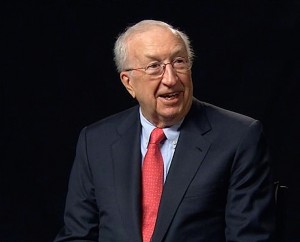He isn’t your typical car guy, fixated on fast cars and powerful engines. But while his game is all about numbers, he isn’t exactly a bean-counter, either. J. David Power III has carved out a unique and, appropriately, powerful position in the automotive industry. And that’s something car buyers around the world should be grateful for.
The 83-year-old former newsboy is the founder of J.D. Power and Associates (JDPA), the California-based arbiter of quality in the automotive industry – and, increasingly, a variety of other industries from airlines to telecomm. With its public studies and private research, JDPA has become a critical link between consumers and manufacturers and, according to many in the car business, can claim a major share of the credit for the dramatic improvement in automotive quality and reliability over the past four decades.
“He gives people their voice in the marketplace,” said Bud Liebler, a former Chrysler marketing vice president, who was on hand to honor Dave Power during his induction into the Automotive Hall of Fame on Thursday night.
That was a doubly significant honor considering there were plenty of folks who’d have been happy to see Power and his company disappear when it first started taking the industry’s pulse back in the 1970s.
“He drove us crazy,” Liebler acknowledged, noting that while it was possible to influence reviewers and other analysts, “You could buy Dave lunch, and maybe a couple martinis, but his numbers were the numbers.”
With an MBA from the University of Pennsylvania’s Wharton School of Finance, the New England native moved to the Midwest in 1962 to work as a researcher at Ford Motor Co. It was an eye-opening environment with Power quickly realizing that Detroit’s Big Three knew surprisingly little about their customers – and didn’t seem to care. So, he left Ford and with late wife Julie, Power moved to California to set up a research firm of his own, originally working on the family’s dining room table.
It was an opportune time, with a flood of new Japanese makers setting up shop on the West Coast and desperate to figure out how to crack Detroit’s hold on the massive U.S. car market. Power’s first break came with a small contract from the ambitious Toyota Motor Co., which flopped when it first came to the States in the ’50s with a line-up of problem-plagued products.
But what put Power on the map was a survey he conducted of those who had bought the first generations of cars powered by Mazda’s revolutionary new Wankel rotary engine. They thought the rotary was great — but only for the first 30,000 miles. Then, a disproportionate number of those engines began to fail, and fail catastrophically. Initially, Mazda denied there was a problem, but the weight of Power’s research was inescapable.
He soon began to sign up a slew of new clients, including the still skeptical makers in Detroit.
JDPA was a name only industry insiders knew. But the company became increasingly familiar to the public in the 1980s and ’90s, as it launched a series of well-publicized studies, such as its Initial Quality Survey, or IQS, that not only tracked what consumers thought about their vehicles, but which named names, openly ranking the best manufacturers and the worst.
The public exposure has had a clear impact on manufacturers. “They’ve all had to work harder to enhance their customers’ experience,” explained Dave Power.
(Buyers question value of trouble-prone tech features. For more, Click Here.)
The surveys still generate some controversy. The IQS for example, doesn’t differentiate between a faulty engine and a hard-to-program navigation system. But despite their differences, “Dave Power has shown us the way to listen to our customers,” said Jim Lentz, Toyota’s CEO for North America.
In turn, customers listen to Power, the company’s eagerly sought endorsements played up high in commercials and promotional material.
(Click Here for details on the 14 worst cars of the decade.)
Today, there is no Dave Power in J.D. Power and Associates. He sold his firm to the McGraw Hill empire in 2005, and retired four years later.
(To see more about why motorists expect to use less fuel in the future, Click Here.)
But his impact is likely to live on, not only in the company he founded but through works like last year’s book, simply titled: Power, though the subtitle tells much more of the story, “How J.D. Power III became the auto industry’s advisor, confessor and eyewitness to history.”
And now, the man who many in the automotive world once wanted to simply go away has himself become a permanent fixture in its history as one of the newest members of the Automotive Hall of Fame.

